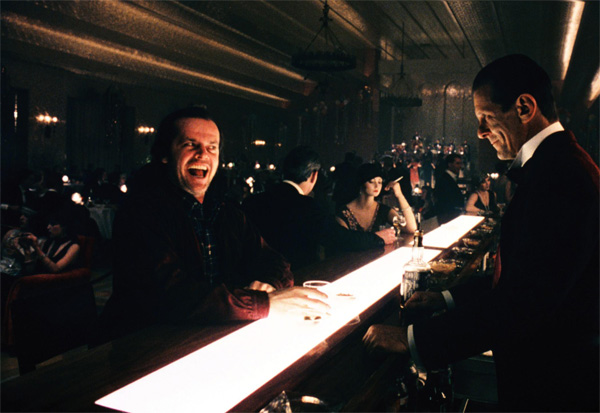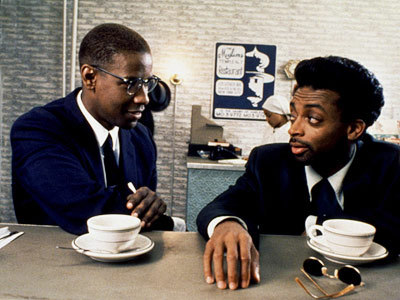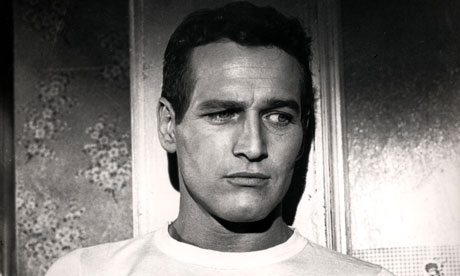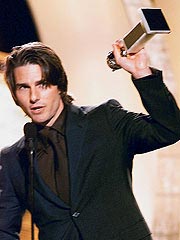There are some actors we go to watch because we know they’ll deliver a great trademark performance that you've come to expect from them. Such a performance is Jack Nicholson from Stanley Kubrick’s 1980 film The Shining, based on the novel by Stephen King. By 1980, Jack Nicholson was already a highly acclaimed actor known for playing rebel troublemakers in movies such as Easy Rider, Five Easy Pieces, The Last Detail, Chinatown and One Flew Over the Cuckoo’s Nest. All those films earned Nicholson Oscar nominations including culminating in an Oscar win for best actor for his performance in One Flew Over the Cuckoo’s Nest in 1975.
 Stanley Kubrick’s The Shining is one of the most acclaimed and artistic horror films ever made. Its story is as basic they come. It involves a writer named Jack Torrance who has accepted an offer of being a caretaker of the isolated Overlook Hotel during its off-season in the winter. Jack has a wife and son that accompany with him to this abandoned motel. Soon after Jack and his family move into this hotel, Jack starts to experience an extreme case of cabin fever and starts to go mad. Jack begins seeing ghosts of dead people who have occupied the hotel over the years. He also has an extreme case of writer’s block but is constantly seen typing. (The repeating message he is typing is revealed in a memorable scene later in the film.) Jack eventually becomes so psychotic that he decides that he must murder his family.
Stanley Kubrick’s The Shining is one of the most acclaimed and artistic horror films ever made. Its story is as basic they come. It involves a writer named Jack Torrance who has accepted an offer of being a caretaker of the isolated Overlook Hotel during its off-season in the winter. Jack has a wife and son that accompany with him to this abandoned motel. Soon after Jack and his family move into this hotel, Jack starts to experience an extreme case of cabin fever and starts to go mad. Jack begins seeing ghosts of dead people who have occupied the hotel over the years. He also has an extreme case of writer’s block but is constantly seen typing. (The repeating message he is typing is revealed in a memorable scene later in the film.) Jack eventually becomes so psychotic that he decides that he must murder his family. Stephen King, the author of the novel the film is based on, was adamantly against the casting of Jack Nicholson. King felt that the casting of Nicholson would tip audiences off too early that his character would eventually go crazy. Stephen King wanted an average-Joe looking actor to play the main character and felt Nicholson already seemed like a crazy person. This was especially true because of Nicholson was most well-known for his role as McMurphy in One Flew Over the Cuckoo’s Nest. I completely agree with Stephen King’s valid points, but he missed the appeal of seeing Nicholson playing this character that suited him so well. Because the simple fact is, no one can play crazy like Jack Nicholson.(link)
With his wild eye brows, his expressive brow, his unkempt hair, his unshaven look and that devilish grin of his; Nicholson can look crazy as well as anyone. Also, in the film Nicholson frequently has his eyes rolled in the back of his head, a look that has become accustomed to someone who is trying to act psychotic. The Shining was a rare opportunity for Nicholson to go all out with his performance and he does so perfectly.
Many film critics criticized Nicholson’s performance claiming he goes over-the-top, but in a film dealing with madness I think going over-the-top is part of the territory. An actor that goes over-the-top implies that you are taken out of the movie and are noticing the actor’s acting. This is not the case of Jack Nicholson in The Shining because we really believe that Nicholson is going absolutely crazy. This wouldn’t have been the case of watching a normal looking actor go crazy, something director Stanley Kubrick was well aware of when he casted Nicholson. Jack Nicholson and his character Jack Torrance can almost be viewed as one and the same, because people’s perception of Nicholson is not far off from his character. I believe this benefits the movie and his performance greatly because we instantly accept Nicholson as this character.
His character of Jack Torrance is one of the most unsympathetic characters Nicholson has ever played, and he’s played quite a few. His character is a recovering alcoholic, he’s angry all the time and he doesn’t seem to have much of a connection with his wife and son. I don’t believe Kubrick ever intended the audience to view Nicholson’s character as someone we could relate to. Rather, Nicholson’s character was a disturbing portrait of a man going nutty.
Many scenes and moments from The Shining have become part of our pop-cultural lexicon and most of them resulted because of Nicholson’s unforgettable performance. One of the most famous scenes from the movie occurs when Jack Nicholson breaks down a door with an axe trying to get to his wife and son. Once Nicholson opens a small hole in the door to look at his terrified wife and son, Nicholson says, “Here Johnny!” in his freakiest voice. The line was ad-libbed (came up with on the spot) by Nicholson, who was referencing The Johnny Carson Show.(link)
 Another brilliant improvisation by Nicholson was he was seen a few times in the film bouncing a tennis ball off the wall when Jack was trying to write but unable too. In the script it just stated that “Jack is not working.” Bouncing a tennis ball off a wall when you’re alone has now become a staple used in film and television when portraying a character who is losing their mind.
Another brilliant improvisation by Nicholson was he was seen a few times in the film bouncing a tennis ball off the wall when Jack was trying to write but unable too. In the script it just stated that “Jack is not working.” Bouncing a tennis ball off a wall when you’re alone has now become a staple used in film and television when portraying a character who is losing their mind. One of the most well-known scenes from the movie is when Jack’s wife Wendy (Shelley Duvall) reads what Jack has been typing throughout his stay at the hotel. She sees the line, “All work and no play make Jack a dull boy” repeated throughout a countless number of pages. Jack then appears and simply but creepily asks, “ How do you like it?” This scene illustrates the incredible momentum a scene can have come from an actor’s performance. Nicholson starts out the scene seemingly calm and in control, but gradually he starts getting angrier, louder and turns violent.
Suprisingly, Nicholson did not receive an Oscar nomination for The Shining, even though it’s arguably now his most renowned performance. People had an idea what to expect when Jack Nicholson was cast in The Shining, but Nicholson went way beyond anyone’s expectations and delivered one of the most terrifying screen performances ever seen on film. It also helped that Nicholson has the perception of being a crazy man in real-life. But whether that is true or not, doesn’t really matter because after watching The Shining there is no doubt that acting crazy is Nicholson’s true forte.








































